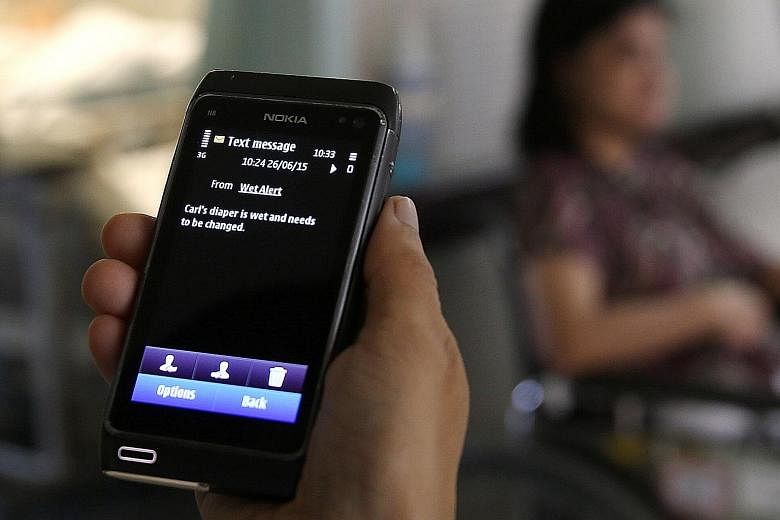A red box flashes on a computer screen and an SMS message tone goes off. A nurse quickly walks over to an elderly man at the corner of a room at St Joseph's Home in Mandai who has soiled himself.
She removes his diaper, cleans him and puts a fresh one on.
An hour later, the alert goes off again and the process is repeated. This time, an old woman on the second floor is cleaned and changed.
This quick response is down to a new made-in-Singapore diaper sensor which alerts caregivers when a patient wets or soils himself.
The device, which may hit the market next year, will be a boon in old folks' homes, where residents can wait for hours to be cleaned, said doctors.
Developed by researchers from the Institute of Bioengineering and Nanotechnology (IBN) at the Agency for Science, Technology and Research (A*Star), the sensor is particularly useful when old folk are unable to speak or ask for help due to stroke or dementia.
Such residents may be left in soiled diapers for prolonged periods, increasing their risk of contracting diaper rash, skin ulceration and infection, said Dr Philip Yap, a senior consultant at Khoo Teck Puat Hospital's department of geriatric medicine, who collaborated on the research.
Although nurses make routine diaper checks at least five times a day, it is impossible to know exactly when one needs changing, explained St Joseph's Home senior nurse manager Gillian Beins.
"Incontinence happens any time; we cannot predict when," she said, noting that with one nurse caring for three residents, it is tough to make the checks more frequent.
Dr Deng Rensheng, a senior research scientist at IBN who led the development of the sensor, said: "Hygiene and health issues aside, lying in soiled diapers for a protracted time is incompatible with care that promotes dignity and respect for the patient."
After three years, the researchers have come up with the final prototype, which they aim to put on trial in a nursing home in two months. They tested a previous prototype at St Joseph's Home. They will commercialise it through their spin-off firm, Wet Alert, set up in March.
The sensor has a metal strip. When fluids come into contact with it, the strip sends a signal to a white box - measuring 5cm by 4cm or smaller than the size of a namecard, and clipped on to the diaper - which transmits the message wirelessly to a computer. At the same time, a text message is sent to nurses' mobile phones.
The disposable metal strip costs two cents. The $30 to $50 transmitter is reusable and needs to be recharged about once a week.
Dr Deng said: "There is no waste of human resource or compromise of healthcare quality."
The sensor will also give caregivers such as Mrs Chua Sim Lim, 57, peace of mind. Her 72-year-old husband, who has dementia, contracted a urinary tract infection after his diaper was not changed timely at a nursing home. The construction equipment rental manager said: "The problem was that we had to depend on routine checks, so at least with the sensor, caregivers will not have to worry that their loved ones are lying in their soiled diaper for hours."
IBN executive director Jackie Ying said the next step is to further develop the sensor so it can measure, for instance, the level of protein in the urine, or detect the presence of red and white blood cells, to tell if someone has developed kidney disease or other ailments.
"We want to go beyond just changing diapers for patients," she said.

